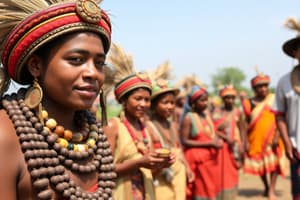Podcast
Questions and Answers
What does 'emic' refer to in research?
What does 'emic' refer to in research?
- The researcher’s interpretation of events.
- A detached observation of cultural practices.
- The participants' perception of their reality. (correct)
- A comparative analysis of different cultures.
Which of the following is NOT a type of production discussed?
Which of the following is NOT a type of production discussed?
- Horticulture
- Pastoralism
- Utilitarianism (correct)
- Agriculture
What is a primary concern regarding ethics in anthropology?
What is a primary concern regarding ethics in anthropology?
- Analyzing data without cultural context.
- Conducting research under the influence.
- Obtaining secular approval.
- Getting permission from study participants. (correct)
What best defines participant observation in anthropology?
What best defines participant observation in anthropology?
What type of ethnography emphasizes reflexivity?
What type of ethnography emphasizes reflexivity?
Which of the following is true about the world economy in anthropology?
Which of the following is true about the world economy in anthropology?
Which principle is essential to follow in anthropology concerning participants?
Which principle is essential to follow in anthropology concerning participants?
What does 'rapproche' refer to in the context of anthropology?
What does 'rapproche' refer to in the context of anthropology?
What defines subsistence in production?
What defines subsistence in production?
Which of the following is a characteristic of industrial production?
Which of the following is a characteristic of industrial production?
What impact does minimal consumption have on resource use?
What impact does minimal consumption have on resource use?
Which statement accurately describes plantations?
Which statement accurately describes plantations?
Why do inequalities exist in consumption?
Why do inequalities exist in consumption?
What method do anthropologists consider instead of cash for consumption?
What method do anthropologists consider instead of cash for consumption?
What is a common misconception about consumerism in society?
What is a common misconception about consumerism in society?
What distinguishes minimal consumption from conventional consumer behavior?
What distinguishes minimal consumption from conventional consumer behavior?
What is a characteristic feature of foraging groups?
What is a characteristic feature of foraging groups?
In many foraging societies, which of the following is true about labor division?
In many foraging societies, which of the following is true about labor division?
How do foragers typically view property relations?
How do foragers typically view property relations?
What distinguishes horticulture from agriculture?
What distinguishes horticulture from agriculture?
Which of the following statements is true regarding foraging cultures?
Which of the following statements is true regarding foraging cultures?
What method is commonly used in shifting horticulture?
What method is commonly used in shifting horticulture?
Which statement about mobility in foraging lifestyles is NOT accurate?
Which statement about mobility in foraging lifestyles is NOT accurate?
In foraging societies, social pressures often exist to maintain which of the following?
In foraging societies, social pressures often exist to maintain which of the following?
What is generalized reciprocity characterized by?
What is generalized reciprocity characterized by?
Which type of reciprocity involves a return of goods expected within a certain time frame?
Which type of reciprocity involves a return of goods expected within a certain time frame?
What defines negative reciprocity?
What defines negative reciprocity?
What does 'tribute' refer to in the context of distribution?
What does 'tribute' refer to in the context of distribution?
What does social distance refer to in terms of reciprocity?
What does social distance refer to in terms of reciprocity?
How does balanced reciprocity function during events like a birthday party?
How does balanced reciprocity function during events like a birthday party?
Which type of distribution is primarily authority-based?
Which type of distribution is primarily authority-based?
Which of the following scenarios best illustrates negative reciprocity?
Which of the following scenarios best illustrates negative reciprocity?
What was Edward Tyler's definition of culture?
What was Edward Tyler's definition of culture?
How do cultures adapt to changes in their environment?
How do cultures adapt to changes in their environment?
What distinctions exist between local culture and macro culture?
What distinctions exist between local culture and macro culture?
In what way is culture different from nature?
In what way is culture different from nature?
What does the concept of symbols in culture imply?
What does the concept of symbols in culture imply?
Why might the characterization of civilizations as 'superior' be problematic?
Why might the characterization of civilizations as 'superior' be problematic?
What is an example of how culture can affect eating practices?
What is an example of how culture can affect eating practices?
Which statement accurately reflects the nature of culture?
Which statement accurately reflects the nature of culture?
Flashcards are hidden until you start studying
Study Notes
Defining Culture
- Edward Tyler, a British anthropologist, defined culture in 1871 as a complex whole encompassing knowledge, beliefs, art, laws, morals, customs, and acquired habits within a society.
- "Complex whole" emphasizes that cultures are intricate systems with multiple interconnected parts.
- No culture is inherently superior or more advanced than another.
- The term "civilization" has outdated and potentially racist connotations in social/cultural anthropology.
Characteristics of Culture
- Levels of Culture:
- Local culture refers to the specific patterns, behaviors, and customs of people within a localized group.
- Macro culture transcends local boundaries and encompasses broader cultural traits.
- Adaptive: Cultures constantly evolve and adapt to changing social and physical environments.
- Distinct from Nature: While basic human needs like food, sleep, and shelter are universal, the cultural practices surrounding these needs vary significantly.
- Symbol-Based: Symbols hold various meanings and are integral to daily life, impacting communication and understanding.
- Qualitative and Quantitative: These are two approaches used in research to study culture.
- Deductive and Inductive: Deductive reasoning starts with a theory and tests it, while inductive reasoning begins with observations and aims to develop a theory.
- Emic and Etic:
- Emic represents the perspective of the people within a culture, focusing on their understanding of their own reality and actions.
- Etic describes the researcher's interpretation of cultural phenomena from an outsider's viewpoint.
Research Methods in Anthropology
- Participant Observation: Researchers immerse themselves in the culture they are studying, engaging in daily activities and building relationships with members of the culture.
- Fieldnotes: Detailed and systematic records of observations, conversations, and reflections made during fieldwork.
- Rapport and Trust: Building trust and rapport is crucial for conducting ethical and insightful research.
- Interviewing: A common method used to collect data through structured or unstructured conversations with individuals.
Writing About Culture
- Ethnographies: Books or articles that provide in-depth descriptions and analyses of a particular culture or group of people.
- Realist ethnographies focus primarily on objectively describing a way of life.
- Reflexive ethnographies incorporate the researcher's experiences and reflections on the research process.
Ethics in Anthropology
- Do no harm: Researchers have a responsibility to avoid causing any harm to the people they study.
- Informed consent: Prior to research, participants must be informed about the project's purpose, risks, and benefits and give their informed consent.
- Project Camelot: A controversial US government project in the 1960s that aimed to use social science research to influence foreign governments, highlighting the importance of ethical considerations in social research.
Anthropology, Economics, and Types of Production
- A Cross-Cultural Study of Economic Systems: Anthropology looks beyond narrow economic perspectives to analyze production, distribution, exchange, and consumption across diverse cultures.
- Types of Production:
- Hunting and gathering: Gathering food through hunting and collecting readily available resources.
- Farming: Cultivating crops and raising livestock.
- Industrial production: Manufacturing and production using advanced technology and specialized machinery.
- Major Categories of Production:
- Foraging: Obtaining food through searching and collecting readily available resources.
- Highly Mobile: Foraging groups often move seasonally to follow available resources.
- Low Control Over Environment: Minimal manipulation of the environment is needed for foraging.
- Horticulture: Cultivating domestic crops and gardens using simple hand tools.
- Shifting Cultivation/Slash and Burn: A common horticultural technique, especially in tropical climates, involving clearing small areas of forest, burning the vegetation to enrich the soil, and then rotating between plots.
- Pastoralism: The raising and herding of livestock.
- Agriculture: Large-scale farming with the use of specialized equipment and chemical inputs like fertilizers.
- Foraging: Obtaining food through searching and collecting readily available resources.
- The World Economy: Even societies with different dominant forms of production are interconnected through global markets and trade.
- Nature/Culture: The relationship between nature and culture is complex and intertwined, with significant impacts from climate change.
Foraging
- First Nations Peoples: Historically, many First Nations groups were foragers.
- Division of Labor: Gender and age often determine the division of labor among foragers, with women and children typically responsible for gathering.
- Property Relations: Foraging societies lack the concept of private property.
- Sharing and Equality: Emphasis on sharing resources and a belief in social equality.
- Use-Rights: People have the right to use resources but do not own them.
- Mobile: Foragers are often mobile, moving seasonally to available resources.
Horticulture
- Simple Hand Tools: Horticulturalists use hand tools for farming (like digging sticks) and rely on rainfall, not irrigation or chemical inputs.
- Types:
- Shifting Cultivation/Slash and Burn: This method enriches the soil by burning cleared forest vegetation.
- Intensive Horticulture: This method uses more intensive techniques, often in permanent fields, and might include the use of fertilizers and irrigation.
Agriculture
- Large-Scale Production: Includes the use of advanced tools, technology, and often chemical inputs.
- Market-Oriented: Agricultural production is primarily for market sales, rather than personal consumption.
Property Relations
- Industrial Agriculture: Land and machinery are often owned by corporations or large landowners, employing workers who do not own these resources.
Consumption
- Subsistence: Producing enough to meet one's own needs and consumption, often with limited reliance on market economies.
- Minimal Consumption: Characterized by minimal consumer demands and sustainable practices to meet those needs.
- Consumer/Consumerism: A society driven by purchasing goods and services, fueled by advertising and economic growth.
- Consumption Funds: Beyond money, anthropologists consider various "funds" as resources for consumption.
Distribution and Exchange
- Reciprocity: The mutual exchange of goods or services, with three types:
- Generalized reciprocity: Giving without expecting an immediate or specific return.
- Balanced reciprocity: Giving with the expectation of a similar return in a reasonable timeframe.
- Negative reciprocity: Attempting to maximize gains while minimizing losses in exchange.
- Distribution: The allocation of resources within a society, often through taxation or government programs.
- Tribute: The payment of goods or services to a political authority, often to demonstrate loyalty and maintain power.
Key Figures
- Edward Tyler: A prominent 19th-century anthropologist who defined culture.
Key Concepts
- Culture: Learned behaviors, beliefs, and customs shared by a group of people.
- Emic: The insider's perspective on a culture.
- Etic: The outsider's perspective on a culture.
- Participant Observation: A research method involving immersion in a culture.
- Ethnography: A detailed study of a culture.
- Foraging: Obtaining food through hunting and gathering.
- Horticulture: Small-scale farming with simple tools.
- Agriculture: Large-scale farming with advanced technology.
- Reciprocity: The exchange of goods or services.
Studying That Suits You
Use AI to generate personalized quizzes and flashcards to suit your learning preferences.




